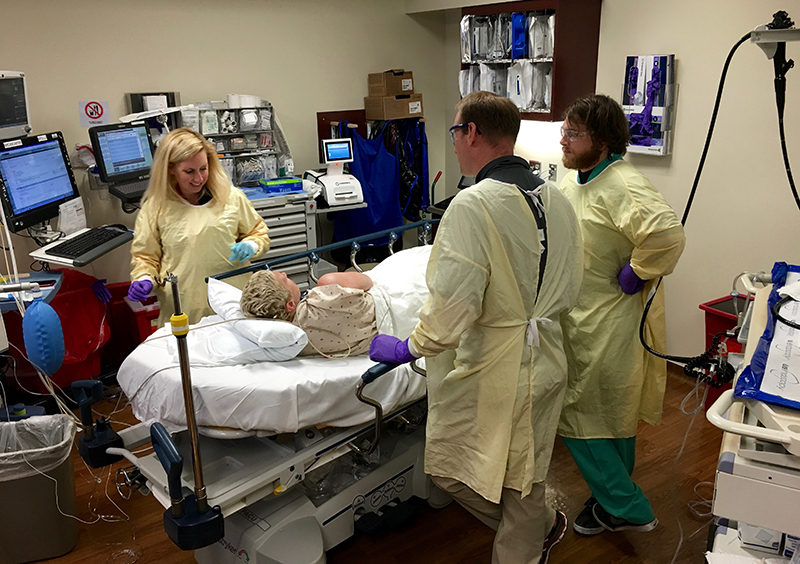
Why Receive a Colonoscopy?
A colonoscopy is the most effective screening tool we have to investigate intestinal issues and colon cancer - the third most common cause of cancer deaths in the United States, according to the American Cancer Society.
The goal of colonoscopy is to detect polyps, small growths in your colon that could become cancerous if nothing is done. When detected early, the chances of a cure rise significantly.
Here's a more in-depth look at what is involved in a colorectal cancer screening.
Thanks to improvements in prevention, early detection and treatment, more than a million people in the U.S. are survivors of colorectal cancer.
The solution is simple. Schedule a colonoscopy and take a morning to do a simple screening test. While the preparation may not be the way you were hoping to spend an evening, the results of the test are a proactive way to cut cancer off at the root. Isn't it worth protecting the rest of your life?
The Nebraska Medicine staff will talk with you ahead of time and answer any all questions regarding the preparation, the procedure, and the follow-up. They will walk you through your day-of details and make sure you are fully ready, from whether or not you should keep taking current medications to if you need a ride to the clinic or home afterwards.
Colonoscopies are billed as a preventive or diagnostic, based on what occurs during the procedure. Many insurance companies cover preventive exams and procedures 100%, meaning no out-of-pocket expense to you. Sometimes a preventative colonoscopy can become a diagnostic colonoscopy. For example, if polyps are discovered during your colonoscopy, the physician will most likely remove them. At that point, the colonoscopy becomes a diagnostic procedure. For a diagnostic procedure, your usual copay, deductible and coinsurance apply. Refer to your benefit plan for detailed coverage information.
Why Get a Colonoscopy at Nebraska Medicine?
Early Detection
Early detection is critical. Your chances of surviving colon cancer depends on what stage it is diagnosed.
A colonoscopy can detect a clump of cells called polyps, which over time, can develop into cancer if they are not removed.
Found in its earliest stages, colon cancer is 90 percent curable. Unfortunately, by the time you have symptoms, you are almost always in a more advanced stage.
Symptoms include blood in the stool, a change in bowel habits, abdominal pain and anemia.
Screening Recommendations
The American Cancer Society recommends that healthy adults have a screening colonoscopy at age 45 and every 10 years thereafter for healthy men and women.
African-Americans, who have a higher incidence of colon polyps and cancer, should begin the screening interval at age 45.
If colorectal cancer is in your family history, the first colonoscopy should be performed 10 years before the age that your first-degree relative was diagnosed.
Family history and environmental causes are the two primary causes of colon cancer. A family history doubles your risk of developing colon cancer.
One-Stop Shop
At Nebraska Medicine, we will make your experience as easy and comfortable as possible.
Once you check in, the actual colonoscopy screening takes just 15 minutes. Patients are put into a twilight sleep and remember little, if anything, of the procedure.
The doctor uses a flexible, slender, lighted tube attached to a video camera to examine the colon.
During the colonoscopy, your doctor has the added benefit of being able to remove precancerous polyps -- quickly and painlessly -- and then obtain a confirmatory biopsy to determine if any cancer cells exist.
Several Convenient Screening Locations
We make screening easy. Schedule your colonoscopy at one of three convenient locations:
Procedures Center at Village Pointe Health Center
111 N. 175th St.
Omaha, NE 68118
Endoscopy at Clarkson Tower
4350 Dewey Ave.
Omaha, NE 68105
Family Medicine at Bellevue Health Center
2510 Bellevue Medical Center Drive, Suite 200
Bellevue, NE 68123
To Schedule Your Colonoscopy, Call 800.922.0000.
Our Locations
-
 Endoscopy at Clarkson Tower Image
Endoscopy at Clarkson Tower Image
-
 Family Medicine Clinic at Bellevue Health Center Image
Family Medicine Clinic at Bellevue Health Center Image
Family Medicine Clinic at Bellevue Health Center
2510 Bellevue Medical Center Drive, Suite 200
Get Directions
Bellevue, NE 68123 -
 Procedures Center at Village Pointe Health Center Image
Procedures Center at Village Pointe Health Center Image